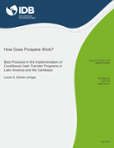How does Prospera Work?: Best Practices in the Implementation of Conditional Cash Transfer Programs in Latin America and the Caribbean
Date
Apr 2016
The Social Inclusion Program PROSPERA is the Mexico's conditional cash transfer (CCT) program, launched in 2014 after its predecessors: the Program for Human Development Oportunidades, and the Program for Education, Health, and Nutrition (Progresa), which entered into force in 2002 and 1997, respectively. In order to determine the eligibility of the households, a proxy means test is applied, based on the data gathered through the Survey of Socio-Economic and Demographic Characteristics of Households (Encuesta de Características Socioeconómicas y Demográficas de los Hogares - ENCASEH), which is answered by a responsible person in the household. Once the families have been accepted in the program, they must comply with their health and education-related co-responsibilities, which compliance is checked once every two months. In order to carry out these actions, the Prospera National Coordination Office (Coordinación Nacional de Prospera), which is in charge of managing the program, and the Secretariats of Public Education and Health allow the certification of compliance with education and healthcare-related actions, as well as the delivery of benefits on a two-month period basis through the payment points. By the end of 2014, 6,129,125 households were receiving benefits from the program. This document is part of a series of studies carried out in several countries of Latin America and the Caribbean with the objective of systematizing understanding of the operations of CCTs. The other case studies are available on the IDB´s Conditional Cash Transfers website.




